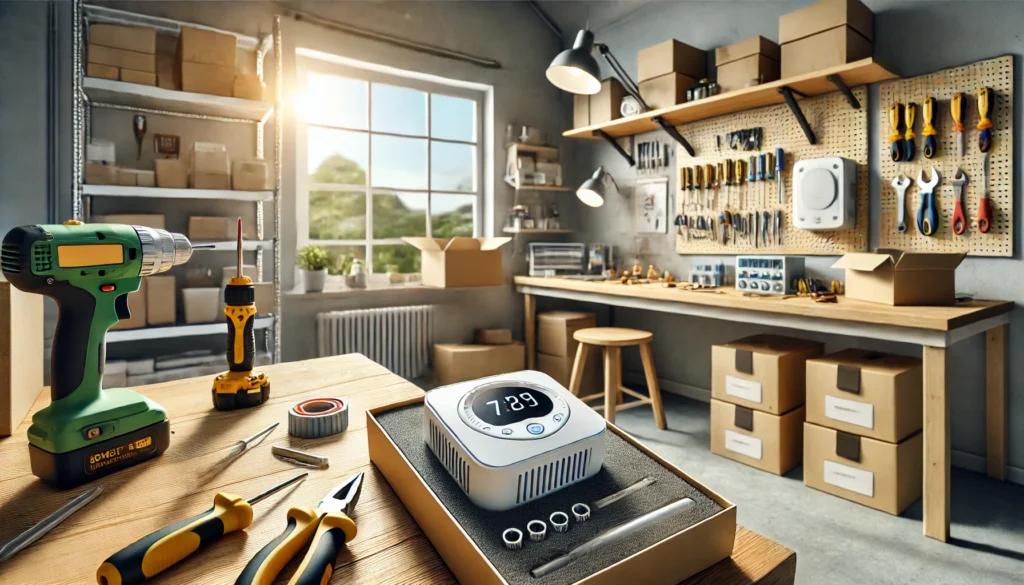Introduction
Smoke detectors are an essential part of any home safety system. However, traditional smoke detectors often lack advanced features that can enhance your home security. Smart smoke detectors offer remote alerts, integration with home automation systems, and advanced monitoring capabilities. In this tutorial, we’ll guide you through the process of upgrading your existing smoke detectors to smart ones. This DIY project is cost-effective and simple, even for beginners. Let’s get started!
Table of Contents
- Why Upgrade to Smart Smoke Detectors?
- Tools and Materials Needed
- Step-by-Step Guide
- Step 1: Choose the Right Smart Smoke Detector Kit
- Step 2: Turn Off Power and Remove the Old Smoke Detector
- Step 3: Install the Smart Module or Replace the Unit
- Step 4: Connect to the Smart App
- Step 5: Test the Smart Smoke Detector
- Tips for Maintaining Smart Smoke Detectors
- FAQs
- Conclusion
1. Why Upgrade to Smart Smoke Detectors?
Smart smoke detectors are not just about safety; they offer a host of modern conveniences:
- Remote Alerts: Receive notifications on your smartphone when smoke or carbon monoxide is detected.
- Integration: Sync with your smart home ecosystem, such as Alexa, Google Home, or Apple HomeKit.
- Self-Testing: Many smart detectors perform regular self-tests and alert you about maintenance needs.
- Advanced Sensors: Detect slow-burning fires or even monitor air quality.

2. Tools and Materials Needed
Before you begin, gather the following:
- Smart smoke detector kit (e.g., Nest Protect, First Alert Onelink, etc.)
- Screwdriver (flathead and Phillips)
- Ladder
- Voltage tester
- Smartphone or tablet
- User manual for the smart detector
3. Step-by-Step Guide
Step 1: Choose the Right Smart Smoke Detector Kit
Select a smart smoke detector that matches your home’s needs. Consider features like dual smoke and carbon monoxide detection, app compatibility, and power source (battery or hardwired).
Step 2: Turn Off Power and Remove the Old Smoke Detector
- Locate your home’s circuit breaker and turn off the power to the smoke detector.
- Use a voltage tester to ensure no current is flowing.
- Unscrew the old detector and disconnect the wiring.
Step 3: Install the Smart Module or Replace the Unit
- If upgrading an existing detector, follow the manufacturer’s instructions to attach the smart module.
- For full replacements, connect the wires of the smart smoke detector to the existing wiring using wire nuts.
- Mount the detector to the ceiling or wall using the included bracket and screws.
Step 4: Connect to the Smart App
- Download the companion app for your smart smoke detector.
- Follow the app’s setup wizard to pair the detector with your Wi-Fi network.
- Test the connectivity by triggering a test alert.
Step 5: Test the Smart Smoke Detector
- Press the test button on the detector to ensure it’s functioning correctly.
- Verify that you receive a notification on your smartphone.
- Confirm the detector is integrated with your smart home system.
4. Tips for Maintaining Smart Smoke Detectors
- Test your detectors monthly to ensure proper functionality.
- Replace batteries annually or as recommended by the manufacturer.
- Keep detectors free of dust and debris for accurate readings.
- Regularly check for firmware updates in the companion app.
5. FAQs
Q: Are smart smoke detectors worth the investment? A: Yes, they offer enhanced safety, convenience, and integration with modern home automation systems.
Q: Can I upgrade my current smoke detectors, or do I need new ones? A: Many smart modules allow you to upgrade existing detectors, but full replacements often offer better features.
Q: Are smart smoke detectors compatible with all smart home systems? A: Check compatibility with your preferred ecosystem (Alexa, Google Home, etc.) before purchasing.
6. Conclusion
Upgrading to smart smoke detectors is a valuable investment in your home’s safety and convenience. This DIY project is straightforward and can be completed in just a few hours. With the ability to receive remote alerts and integrate with other smart devices, you’ll gain peace of mind knowing your home is better protected.